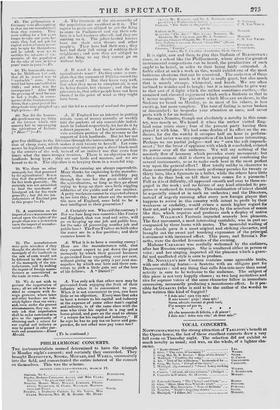PHILHARMONIC CONCERTS.
THE instrumentalists seemed determined to have the triumph in Monday night's concert; and certainly they succeeded. They brought BEETHOVEN, SPOHR, MOZART, and WEBER, successively into the field, and concentrated the entire interest of the concert on themselves. This was the scheme.
SECOND CONCERT—MONDAY, SIARCH 17.
ACT I.
EETIIOVEN.
PAESIELLO.
CPOIIR.
Sinfonia. No 8
Duette, Madame CORADORI Am LAN. and Miss CLARA NOVEL," " Ne giorni tuoi feFei " Nonetto, Messrs. MORT, MORA LT, Ltzenr.re, DRAGE/. NETT', NICHOLSON, G. COOKE, WIE LMA DI, MACKIN-
TO■fl. arid PLATT
Rosana, a Dratnatie Cantata. for Six Voices. Miss
et.aaa NOVELL°. Mrs. H. R. Bisuoe, Mr. Hoax- CA,1 a. lit. B Cs ' t u HMI M r. NoVELLO; cent. 1.o.ed far t u Pailliarnmi V N ELI O. fher.ure, " The Ruler of tliespirits" C. VON Wen:.a.
D
S:nfimia in ACT II.
Mit/ART.
Q tart etto.. Ch, Alin.? " Miss I. NovEr.t.o, Mr. BENNETT, Mr. CHAPMAN, HIM Mr. A. NOVELLE, MOZ OCT. KUM:Ski, Clarinet Oldigato, Mr. WILLNIAN C. 51. Vos Aria. Madalllt, CARA Dual PrLLA iS " Ci ran Dio!" (Roue() aiulittta), G car., twit r.
Cin
,Eeniut. Overl Aire. " " Leader, Mr. F. C HAM Ea—Conductor, Sir G. SNIART.
It is right, now and then, to play this Sinfonia of BEETHOVEN ; SitIVC, in a school like the Philharmonic, where alone the greatest instrumental compositions eun be heard, the peculiarities of each ought to be heard, in order to their being fairly estimated. A feeble effort at such a work as this, would exhibit one of the most ludicrous abortions that can be conceived. The orchestra of these concerts develops much in it that is really great, but also much that is merely strange, whimsical, and harsh. We are often inclined to wonder and to laugh ; but it is impossible to give way to that sort of &light which the author sometimes excites,—the unmixed and elevated enjoyment which such a Sinfonia as that in C minor inspires. The pleasure which MOZART awakens, in the Sinfonia we beard on Monday, as in most of his others, is less excitiog, but more complete. The tone of feeling is never broken or diminished : he bespeaks your attention at once, and never parts with it for an instant.
SPOHR'S Nonetto, though not absolutely a novelty in this coun- try, was nearly so. We heard it when the author visited Eng- land sonic years since ; four of the present party having thou played it with him. We had some doubts of its effect on the au- dience, for (by the watch) it occupies half an hour in perform- ance: but never was any composition of its kind more interesting. Perhaps we are partial judges—and we " own the soft itnpeach- merit ;” but the burst of applause with which it concluded, evinced its power over all the audience. We will say nothing of the masterly flow of harmony which pervades every inurement; but what constimmte skill is shown in grouping and combining the several instruments, so as to make each bear in the most perfect way upon the general effect! How totally unlike in character to those concerted pieces where each performer parades for twenty or thirty bars, like a tigurante in a ballet, while the others have little else to do than look on till their turn comes for a pirouette! Full as it is of difficulty, all appeared smooth and easy to those en- gaged in the work ; and no failure of any kind attended its pro- gress or weakened its triumph. This combination of talent should be especially aimed at in such an orchestra ; and the Directors, instead of eagerly running after every new foreign player that happens to arrive in this country with intent to profit by their weakness or credulity, would evince a much higher regard for their art, and a juster sense of their duty, by the selection of music like this, which requires and produces such a display of native power. WILLMAN'S Fantasia imparted scarcely less pleasure. The first movement, a most interesting cantabile, was in part ac- companied by three horns with mutes. The mournful wailing of their chords gave it a most original and striking character, and brought out the sweet and touching expression of the principal. instrument with increased effect. This piece, and SPOHR'S No- netto, were the decided favourites of the evening.
Madame CARADORI was cordially welcomed by the audience, after her Russian campaign. She is unaltered either in person or voice ; and her singing imparted all the pleasure which a grace- ful and unaffected style is sure to produce. Mr. NOVELLO'S new Cantata contains some agreeable traits,
with one striking feature—a Sestetto with an obligato part for DRAGONETTI : and any thing that calls hint into more than usual activity is sure to be welcome to the audience. The subject of this piece is not very happily chosen ; as two long recitatives and airs for soprano voices of the same character follow in immediate succession, necessarily producing a monotonous effect. Is it pos- sible for GUARINI (who is said to be the author of the words) to. have written this kind of doggrcl?
I dolo mio! cara vita mia!
11 niio tesoro ! gioja! alma mia!
Sposa adorata eccomi ai piedi tuoi,
Per sempre sol per te.
s a a • a • • Ahiclie moment° di felieita, e di placer! I dolo mio! dolce mia vita! all tesor mio!"




















 Previous page
Previous page